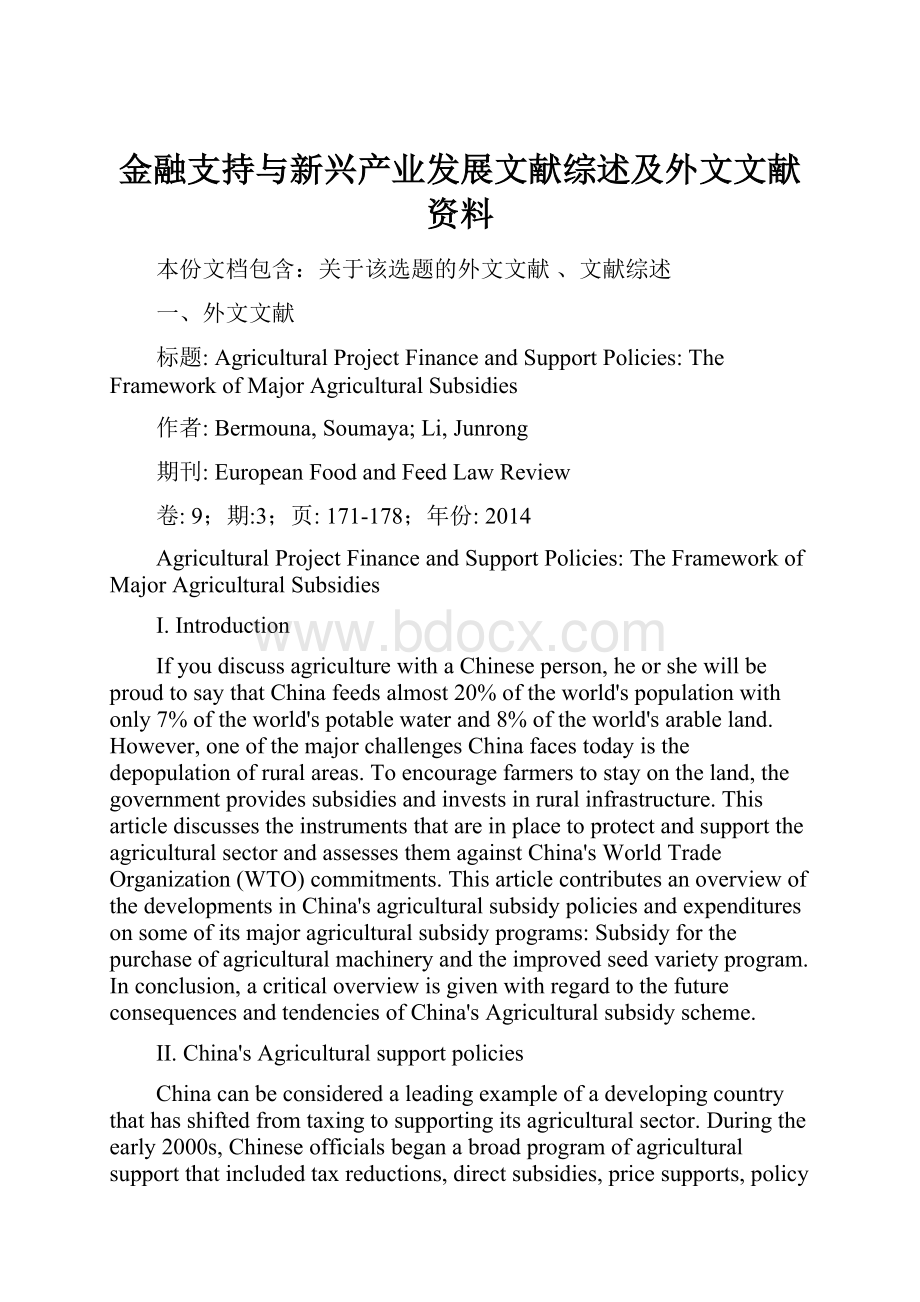金融支持与新兴产业发展文献综述及外文文献资料.docx
《金融支持与新兴产业发展文献综述及外文文献资料.docx》由会员分享,可在线阅读,更多相关《金融支持与新兴产业发展文献综述及外文文献资料.docx(13页珍藏版)》请在冰豆网上搜索。

金融支持与新兴产业发展文献综述及外文文献资料
本份文档包含:
关于该选题的外文文献、文献综述
一、外文文献
标题:
AgriculturalProjectFinanceandSupportPolicies:
TheFrameworkofMajorAgriculturalSubsidies
作者:
Bermouna,Soumaya;Li,Junrong
期刊:
EuropeanFoodandFeedLawReview
卷:
9;期:
3;页:
171-178;年份:
2014
AgriculturalProjectFinanceandSupportPolicies:
TheFrameworkofMajorAgriculturalSubsidies
I.Introduction
IfyoudiscussagriculturewithaChineseperson,heorshewillbeproudtosaythatChinafeedsalmost20%oftheworld'spopulationwithonly7%oftheworld'spotablewaterand8%oftheworld'sarableland.However,oneofthemajorchallengesChinafacestodayisthedepopulationofruralareas.Toencouragefarmerstostayontheland,thegovernmentprovidessubsidiesandinvestsinruralinfrastructure.ThisarticlediscussestheinstrumentsthatareinplacetoprotectandsupporttheagriculturalsectorandassessesthemagainstChina'sWorldTradeOrganization(WTO)commitments.ThisarticlecontributesanoverviewofthedevelopmentsinChina'sagriculturalsubsidypoliciesandexpendituresonsomeofitsmajoragriculturalsubsidyprograms:
Subsidyforthepurchaseofagriculturalmachineryandtheimprovedseedvarietyprogram.Inconclusion,acriticaloverviewisgivenwithregardtothefutureconsequencesandtendenciesofChina'sAgriculturalsubsidyscheme.
II.China'sAgriculturalsupportpolicies
Chinacanbeconsideredaleadingexampleofadevelopingcountrythathasshiftedfromtaxingtosupportingitsagriculturalsector.Duringtheearly2000s,Chineseofficialsbeganabroadprogramofagriculturalsupportthatincludedtaxreductions,directsubsidies,pricesupports,policyloans,expenditureoninfrastructure,andintergovernmentaltransfers.Sincethen,agriculturalsupportprogramshaveexpandedrapidlyinsizeandscope.Documentsoutliningpoliciesandstrategies,suchasthecountry's5-yearplanfor2011-15andthecentralauthorities'2014"Number1Document",1callsforruralreform,developingmodernagricultureandmaintainingagricultureasthefoundationofChina'seconomy.
1.Historicaloutlook
TheChineseeconomyhaslongbeencharacterizedbydiscriminationagainstagriculturearisingfromgovernmentpolicies,manyofwhichdatebacktopre-socialisttimes.Thegovernmenteithertaxedagricultureexplicitlyorsetcommoditypricesbelowmarket-determinedlevels.3TheagriculturalsectorisapartofChina’smajorindustries,andtheagriculturaltaxisthereforeofthenationalfinance.Thegovernmentcollectedanagriculturaltaxcalled"GongLiang"fromthelegalentitiesorindividualswhoengagedinagriculturalproductionorgainedincomefromagriculture.AfterthefoundingofthePeople'sRepublicofChina(PRC)in1949,thefirstregulationregardingagriculturaltax,the"RegulationsfortheAgriculturalTaxofthePeople'sRepublicofChina",wasapprovedonthe3rdofJune1958inthefirstNationalPeople'sCongressExecutiveCommittee96thmeeting.
Bythe1970s,evidencehadmountedthatthegovernmentinterventionswerenoteffective.Pooreconomicperformance,astagnatingagriculturalsectorandintensifyingpoliticalpressureforcedthecountrytoacceptmuch-neededagriculturalpolicyreformswithinthebroadercontextofeconomicreformsthatstartedin1978.Theagriculturalreformmeasuresweregenerallydesignedtoreduceoreliminatepricecontrolsandstatecontrolledmarketing.
Afterseveralyearsofregionalexperiments,theChineseCentralGovernmentandStateCouncilissuedthe"No.1Document"in2004thatprovideskeyCentralGovernmentpolicyguidelinesonagricultureandruraldevelopment.Thegovernmentbegantoeliminatetheagriculturaltaxonfarmersandintroducedtwomainsubsidies:
directpaymenttograinproducersandunimprovedseedsubsidy.Further,somecitiesconductedanexperimentinwhichtheyofferedapartialrebateforfarmmachinerypurchases.Intheannualgovernmentworkreportfor2006tothecountry'stoplegislature,theformerwouldbeabolishedthroughoutthecountry.Fromthenon,theagriculturaltaxbecamehistory.
2.Development
AttheWorldTradeOrganization'sDohaRoundin2001,manydevelopingnations-includingBrazil,ChinaandIndia-opposedagriculturalsubsidiesintheUSandtheEU.Theyarguedthatthehighsubsidieswereartificiallydrivingdownglobalcropprices,unfairlyunderminingsmallfarmersandmaintainingpovertyinmanydevelopingcountries.InthesameperiodChinaimplementedthenewfoodpolicyin2001,creatingcertainareasasmarketsalesareas,eliminatingthepurchasesoffixedquantitiesfromfarmersaswellaspricecontrols,andestablishingothersasprotectedproductionareas,inwhichmoreinterventionistpoliciesaremaintained.7AlthoughChinaconsidersitselfadevelopingcountrymemberoftheWTO,itisnoteligibleforthesametreatmentasotherdevelopingcountries.A'deminims'agriculturalsupportlimitof8.5percentofthetotalagriculturaloutputvalueappliestoChinainsteadof10%.Thesubsidylimitresultedfromtheso-called"U.S.-ChinaBilateralWTOAgreement",acompromisereachedinJune2001betweentheUnitedStatesandChina.Consequently,China's2001WTOaccessionagreementsetrelativelylowagriculturaltariffsandplacedlimitsondomesticagriculturalsupportthatwerestricterthanthosefordevelopingcountriesbutlessstrictthanthosefordevelopedcountries.DuringtheyearsleadinguptoitsWTOaccession,Chinahadeliminatedmanyofthepricedistortionsthathadcharacterizeditsagriculturalmarketsinearlierdecades.
III.PolicyObjectives&Institutions
SustainingfoodsecurityhasalwaysbeenoneofthemostimportantgoalsforgovernmentsatalllevelsinChina.Howdothemajorfinancialsupportpoliciesworkandhowandwhogovernsthem?
China'smajorpolicyobjectivesrelatedtoagriculturefor2014areto"deepenagriculturalreformandaccelerateagriculturalmodernization;improvethemechanismsforsafeguardingfoodsecurity;seeksustainableagriculturalgrowthwhilebalancingruralandurbandevelopment;deepenrurallandreformsandpromotingfinancialsupportforruralareas.9
HeretorelatedthecurrentChina's12thFive-YearPlan(2011-15)focusesonthefollowingaspects:
1)farmersandcountryside,2)grainproductioncapacity-toexceed540milliontonsperyearandtosustainatleast95%self-sufficiency,3)increasingruralhouseholds'incomes,4)improvingfoodsafety,5)enhancingenvironmentalprotection,and6)increasingagriculturalcompetitivenessandimprovingsocialandtechnicalinfrastructureinruralareas.10TheruraleconomyisatthecentreofChina's12thFive-YearPlan,whichaimsatrebalancinggrowththroughnarrowingrural-urbangapsandpromotingrural-urbanintegration.Improvingruralwelfareandboostingruralincomeareviewedascriticaltoenhancingdomesticdemand.
In2012,China'sMinistryofFinancereportedthatbudgetedspendingforagriculturalproductionrosetoUSD76billion(EUR55billion).TheprogramshowninFigure1accountedforabouthalfofthattotal.OthermajorexpendituresincludedUSD9.8billion(EUR7.1billion)forsubsidizedloansandstorageofcommoditiesandUSD17.3billion(EUR12.5billion)forirrigationandwaterprojectsandonfarminfrastructurespending.11Figure1showsasignificantincreaseinChina'sexpendituresonmajoragriculturalsubsidyprogramsintheperiod2004(shortlyafterWTOaccession)-2012.
Financialsubsidypoliciesareexecutedbyawidevarietyofprogramssupportingdevelopmentoftheagriculturalinfrastructure,includingirrigationanddrainagefacilities.Figure2showsthedevelopmentofsubsidyexpenditureontheseareas.ThegrowthinsubsidypaymentstoChinesefarmersreflectsthestrategyofincreasingsubsidiesannually.Theimproved-seedsubsidywasincreasedtenfoldtoUSD3.4billion(EUR2.5billion)byaddingmorecropsandextendingthegeographiccoverageoftheprogram.Themachinery-purchasesubsidywasincreasedbyanevengreatermargin,reachingUSD3.1billion(EUR2.28billion)in2012.Hereinafterthesesystemsandthewaytheyaregovernedwillbediscussed.
IV.Subsidyforthepurchaseofagriculturalmachinery
China'sagriculturalmachinerypurchasesubsidypolicy,whichstartedin2004,hassignificantlystimulatedthepurchaseofmachinerybyfarmers,promotedthegrowthofagriculturalmechanizationandincreasedyields,farmingefficiencyandfarmers'incomes.12-13Zhong14saidthatagriculturalmachinerypurchasesubsidyshouldbeimperativeandenlargedinChina.ThepopularizationofagriculturalmachineryisofcrucialimportancetotheChinesepathtowardsbecominganagriculturalpower.Duringthesecondsessionofthe11thNPC,formerChinesePrimeMinisterWenfirstproposedinthegovernment'sworkreportthatthescheduledagriculturalmachinerypurchasesubsidyamountstoCNY13billion(EUR1.5billion)andwouldcoverallagriculturalfieldsnationwide.
Thestatecouncilexecutivemeeting,heldin2008,resolvedthatCNY10billion(EUR1.16billion)willbegrantedbytheCentralGovernmenttotheagriculturalmachinerypurchasesubsidyin2009.ZongJinyao,thedirectoroftheagriculturalmechanizationdivisionoftheagricultureministry,saidthattheadditionalCNY3billion(EUR0.35billion)in2009wouldhelptofurthermeetfarmers'desirestobuymoremachineryand,atthesametime,stimulatethedevelopmentoftheagriculturalmachineryindustry,whichyieldsmultiplebenefits.BoththeMinistryofAgriculture(MoA)andtheMinistryofFinance(MoF)wouldfollowtheoriginalschemetoallocateassoonaspossiblethesubsidynationwide.
InChina,twomainreasonsforfarmerstopurchasemachineryaretofacilitatelarge-scaleoperationsandtooffercustomservicestoother